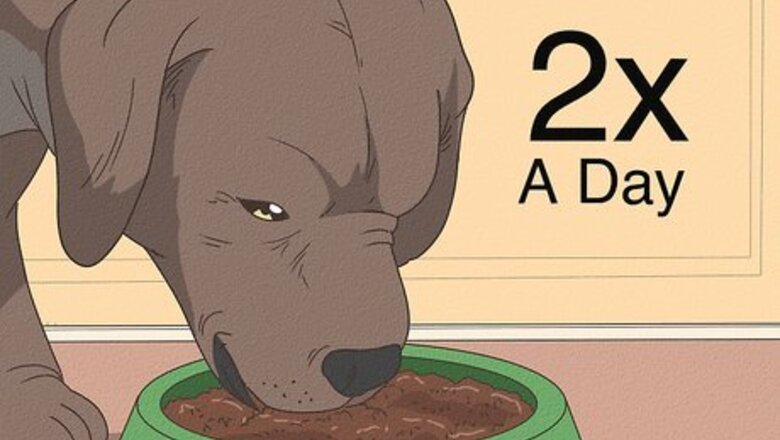
views
Providing the Basics
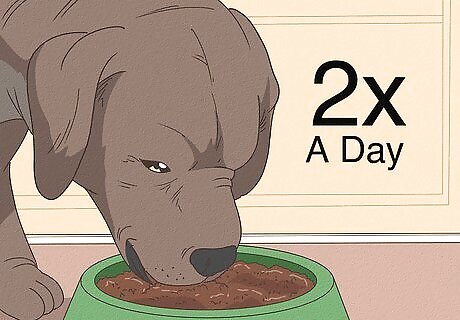
Feed your American pit bull terrier the right food twice a day. Many pit bulls prefer an active, athletic lifestyle. Meeting this high energy need requires a diet high in protein and low in carbohydrates. If your dog doesn't get as much exercise as you would like, choose a lower-protein food instead. A good dog food will be mostly meat, with few fillers such as rice, peanut hulls, soybean mill, or corn bran. Wet canned food and dry kibble are both acceptable.
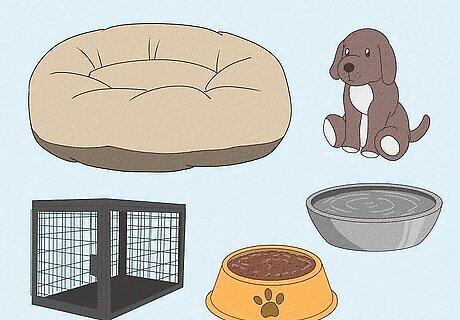
Furnish your home with dog supplies. It is important that you set up a comfortable environment for your dog. Your pit bull will need their own bed, food, toys, and blankets. Provide a variety of interesting toys, such chew toys, food puzzles, stuffed animals, balls, and rope toys. You should have at least one dog bed for your dog, but you may choose to have a few places around the house for your dog to sleep. Buy an appropriately sized crate if are planning to crate train your pit bull. The crate will give your dog a private den to sleep and rest in. Each dog should have their own food and water dish.
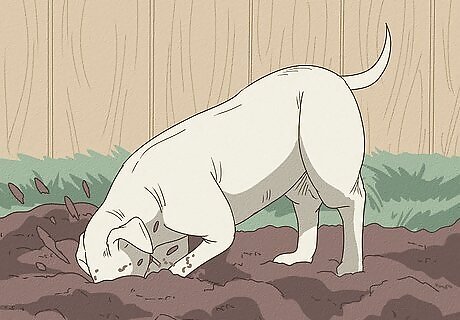
Give your pit bull terrier enough space. The best home for an American Pit Bull Terrier is one in which the dog has plenty of room to play and exercise. While pit bulls can live in apartments or homes without yards, it preferable that they have a fenced yard that they can play in as they are very active dogs. Pit bulls also have a tendency to dig, so it is good to give them an area in the yard where they are allowed to do so.
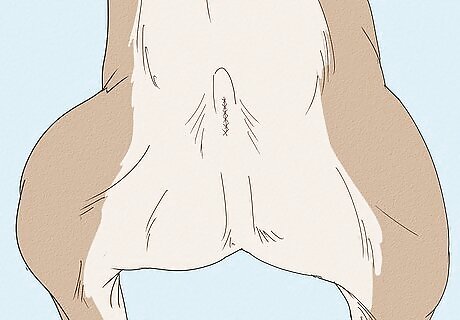
Spay or neuter your pet. Pit bulls are one of the most commonly surrendered dogs at shelters. Unless you are seriously considering breeding pure bred American Pit Bull Terriers, you should neuter or spay your dog to prevent unwanted pregnancies. Spaying and neutering your pit bull can also reduce aggression and the likelihood that they will bite. Neutered males are less aggressive, and they will be less likely to escape the house looking for a female to mate with. Neutering also reduces the chance of your dog developing testicular or prostate cancer.
Training Your Pit Bull Terrier
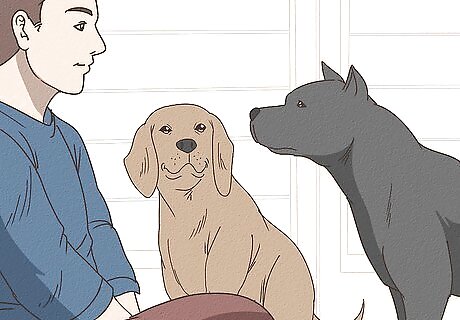
Socialize your pit bull with other dogs and people. While not all pit bulls are aggressive, there is stronger tendency in the breed for aggressive behavior, particularly towards other dogs. Letting your pit bull interact with other dogs from an early age will help them understand that other animals and people are not threats. It might also reduce their aggressive tendencies in social situations. The younger you begin socializing your pit bull, the more adjusted they will become to their surroundings. The first six months are particularly vital in socializing your dog. Try introducing your pit bull to lots of different people and dogs. When they're young, they'll learn how to properly communicate and interact with these other animals and people. As they get older, they'll remember those skills and become really well-rounded adult dogs. Avoid leaving your pit bull with another dog unattended. American pit bull terriers do have a tendency to fight with other dogs. Even well socialized pit bulls can be aggressive towards other dogs if left unsupervised. Dog parks and doggy day cares may not be appropriate for your pit bull. While some pit bulls can learn to interact well with other animals, they are still an aggressive breed, and they are prone to fighting with other dogs. All interactions with other dogs should be supervised.
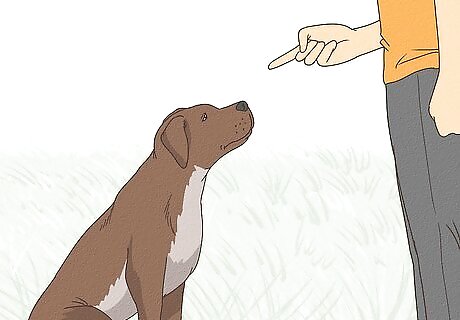
Begin training as soon as you bring them home. By nature, pit bulls are strong-willed and highly intelligent, but they are also eager to please. If you begin training as soon as they enter your home, they will quickly pick up the house rules without developing bad habits. Start by teaching them basic commands such as “sit,” “come,” and “stay.” Give them a treat when they properly follow the command. If your pit bull does something wrong, do not hit or yell at them, as this can make them afraid of you and increase their aggression. Reward the dog instead when they do something right, and they will learn proper behavior quickly.
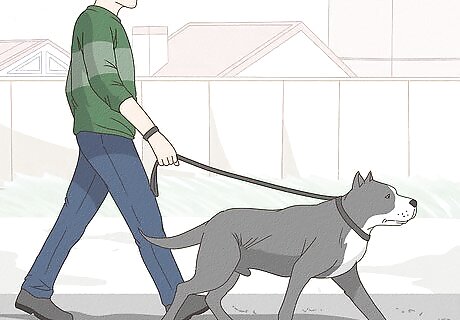
Teach your pit bull how to walk on a leash. Because the breed is very energetic and strong, your dog may have the urge to run ahead of you or tug at the leash. By pulling back firmly and encouraging them to walk by your side, your pit bull will learn leash manners, and your walks will become easy and enjoyable. Leashed walks around other people and dogs can also help socialize your pit bull. Let your pit bull interact with others, but be ready to remove them from the situation if they become upset or aggressive.

Housebreak your American pit bull terrier. Housebreaking is generally easy to accomplish with pit bulls. The best method to use for teaching your dog not to eliminate inside the house is to take them outside frequently and on a regular schedule. Take your pit bull outdoors first thing in the morning, after meals and playtime, and before bedtime. This will allow your dog to adjust to a break schedule while teaching them that inside is not the appropriate place to eliminate. When you first bring your pit bull home, you should watch them carefully to make sure that they do not have accidents inside the house. If you catch them going in the house, interrupt them and take them outside.
Keeping Your Dog Fit and Healthy
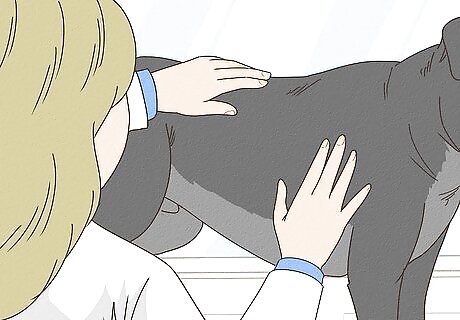
Visit the veterinarian for regular routine care. These visits should consist of an annual exam, yearly vaccinations and a prescription for a regimen of flea, tick, and heartworm preventatives. Let your vet know if you are struggling with any aggression or hyperactivity in your pit bull. They may be able to help. While the American pit bull terrier is a breed that has few health problems, some pit bulls are prone to hip dysplasia, hypothyroidism, allergies and congenital heart conditions.
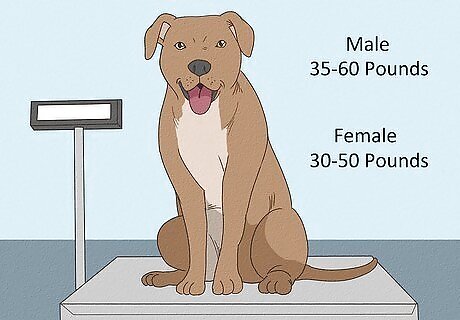
Maintain a healthy weight. Obesity is a big problem in dogs, particularly in American Pit Bull Terriers, which are often bred for size. Ideally, a male should be between 35 and 60 pounds. A female should be between 30 and 50 pounds. Have your vet weigh the dog at every visit so that you understand your dog’s size fluctuations. Do not feed your pit bull more than twice a day, and avoid giving them table scraps to help keep them at a healthy weight.
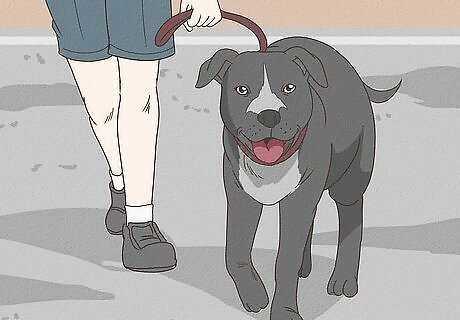
Take your pit bull terrier on a daily walk. Pit bulls have a lot of energy, and they need plenty of exercise to channel it in a positive way. Dogs that do not get enough exercise may resort to destructive behavior such as destroying household items. Walking your pit bull at least once a day is a good start to fulfilling their exercise needs. Start with ten to fifteen minute walks. After a few weeks, try increasing the length of the walk. You might even start walking them twice a day. You can also take your adult pit bull on a run or jog with you.
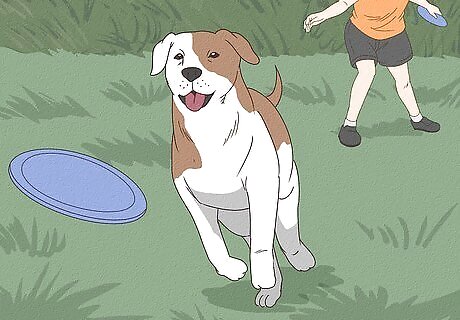
Play with your pit bull. Games will help you bond with your pit bull while helping them exercise and increasing their social skills. You can play fetch with a ball or frisbee, or you can try tug of war with a rope toy. Pit bulls also enjoy activities such as swimming, running, and lure coursing. Try taking them on a hike or out to the beach.
Grooming your Dog
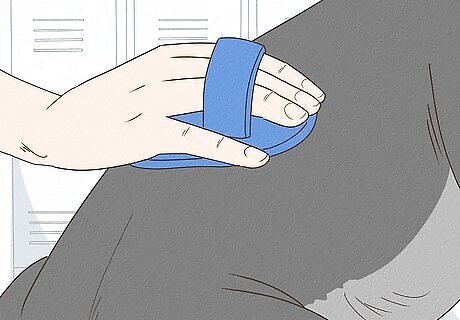
Brush their coat. To reduce shedding and to keep their coat shiny, you should brush your pit bull terrier’s coat several times a week. Use a rubber curry brush for the best results. This will remove excess fur and dead skin cells. When your dog is shedding, typically in late spring and early fall, brushing them daily will keep their coat looking its best.
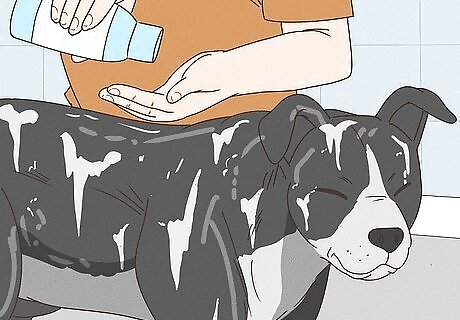
Bathe your pit bull as needed. The breed has an easy coat to care for and is not prone to skin problems. They do not need frequent baths. You should wash them when they are muddy or dirty. Use a shampoo made for dogs, not humans.
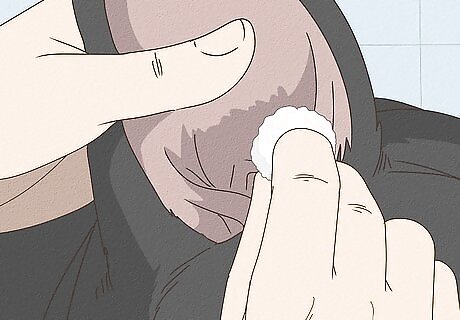
Check their ears. If your pit bull terrier keeps scratching their ears or if there is visible discharge around the ears, you may need to clean them. Check the ears for a build-up of earwax. Add a few drops of dog ear cleaning solution, and massage the ear. Use a cotton ball to wipe up any solution or wax from the ear. This should not be painful. If your dog is upset, whining, or in pain, call your vet. It might be an ear infection. Some dogs do not like to have their ears touched. If your pit bull is a puppy, you can get them used to having their ears cleaned by touching their ears often. If you have an older pit bull who was not socialized as a puppy, you may want to ask your vet to clean their ears for you.

















Comments
0 comment